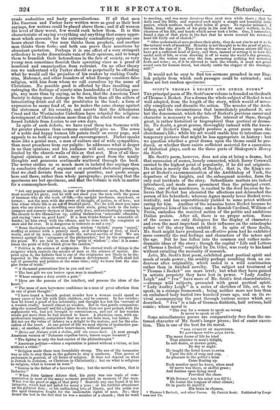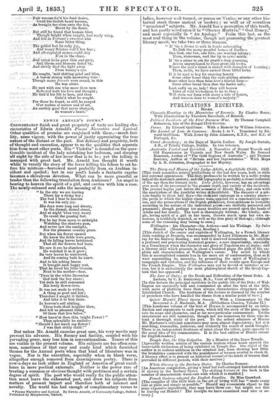SCOTT'S THOMAS aBECKET AND OTHER POEMS. * Tin principal poem of
Mr. Scott's newvolume is founded on the death of Thomas a Becket. For a drama the whole subject of Becket is not well adapted, from the length of the story, which would of neces- sity complicate and disunite the action. The murder of the Arch- bishop, and the circumstances that immediately produced it, are but the denouement, which the tale of Becket's previous career and character is necessary to produce. The interest of these, though great, is rather historical or biographical than poetical or drama- tic. No doubt, a great genius, thoroughly imbued with the know- ledge of Becket's time' might produce a great poem upon the churchman's life ; while his art would enable him to introduce con- temporary pictures that might be less appropriate in history : but we question whether a great drama upon the theme could be pro- duced, or whether there exists sufficient material for a succession of historical plays, such as the three parts of Shakspere's Henry the Sixth.
Mr. Scott's poem, however, does not aim at being a drama, but that succession of scenes, loosely connected, which Barry Cornwall carried to the highest point of popularity, if he did not originate. Its action is merely the death of Becket; that is, the Kings an- ger at Becket's excommunication of the Archbishop of York, the departure of the knights, and the subsequent murder, form the only real incidents of the story. Subordinate matters are indeed introduced, and made more prominent than the principal event. Tracy, one of the murderers, is excited to the deed because he be- lieves that Becket has alienated the affections and debauched the person of his betrothed; whereas Agnes merely loves Becket reve- rentially, and has superstitiously yielded to some priest without caring for him. Another of the assassins hates Becket because he has deprived him of his victim ; and a Romish Cardinal, William of Pavia, embodies the received notion of the politic and ambitious Italian prelate. After all, there is no proper action. Some of the scenes are only dialogues for the display of character ; and even the most important in their influence on the catastrophe rather tell the story than exhibit it. In spite of these faults, Mr. Scott might have produced an effective poem had he exhibited more correctly the real feelings and characters of the actors and the age. But he has fallen into the common and rather melo- dramatic ideas of the story ; though the capital "Life and Letters of Thomas a Becket," compiled by Dr. Giles, was ready to his hand without entailing the necessity of research. Lelio, Mr. Scott's first poem, exhibited great poetical spirit and much of crude power ; the crudity perhaps resulting from an en- deavour after originality, which ended in a wild combination rather than in finished novelty. The subject and treatment of "Thomas a Becket" are more level; but what they have gained in artistic propriety they have lost in power. "Lady Audley Leigh" and "Iva" have more of Mr. Scott's first characteristics, —strange wild subjects, presented with great poetical spirit. "Lady Audley Leigh" is a series of sketches of life, set, so to speak, in a strange framework ; being neither more nor less than an embalmed body buried two hundred years ago, and on its re- vival accompanying the poet through various scenes which are described. " Iva " is a tale of German diablerie, half serious, half comic; whose moral is
"The way for a woman to speak no wrong
Is never to speak at all."
Some miscellaneous poems are comparatively free from the un- tamed character of Mr. Scott's longer pieces; but of easier execu- tion. This is one of the best for its moral.
"Tan PIIESIIIT OF HAPPINESS.
Tel twa-rriptou pkya irrriv.
The many forms of life he tried
That minister to man's delight, In soft desire or sterner pride, 'By day or night.
He taught the festal hours to swim.
Upon the tide of song and cup, As pleasure to the goblet's brim Came floating up.
Each manlier sport he knew, when need Of nerve was there, or skilful grace ; And fearless upon flying steed Provoked the chase.
With Science' lore his mind was Bird; He learnt the tongues of other climes ; Or in poetic fit distill'd His brain in rhymes.
' Thomas Beckett, and other Poems. By Patrick Scott. Published- by Long- man and Co.
' ; sithiFatilWemanifixThl-his
idinuE",t hearthecame, lojrwn mai hrodgliktootlose unto the fire, .1, ' `Burnt by the flame. Tut stlhe found that human bliss,
-- Thongh bright when caught, had ready wing, And felt in Fortune's sweetest kiss
/I lqe Some bitter thing.: • io 1001. The goblet lost its ruby joy,
And weary Science vell'd her face ; And oft-repeated scenes could cloy E'en in the chase. .
enr▪ "-"-PgJou m And raven locks grow thin and grey,
e•,4 It:
: P8c"'''13 tuibr aid blossom by, kud;loididtglig faded
From beauty's eye.
P ilelsonglat, 'Mid shifting grief and bliss,
Lac:c-,; A bode& strung with tone : 'Though many friends were round, in this
He was alone.
v Iletnet with one who more than men Reflected both-his love and thought ; He link'd his life to hers, and then
„Tun of z Gain'd what he sought.
-.•-ce,a 10 -For there-lie found, as still he e
• and O'er realms of nature and of art
;PI ...An earthly good that never changed,
f, YI. • In woman's heart."
fl1,,



























 Previous page
Previous page